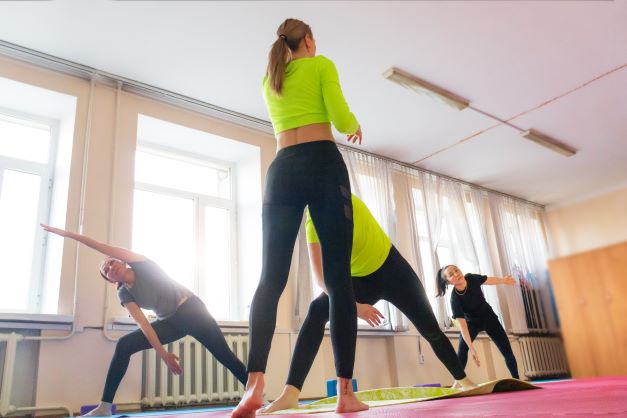What Skills Do You Get From Yoga?

Yoga is an ancient practice that can help you develop a wide range of skills. These lessons can help you improve your strength and flexibility so that you can apply them in your everyday life.
Yoga classes are a great way for you to strengthen your body and improve your balance. It can also help calm your mind.
Strength
Yoga is a strength-based exercise that makes use of your body weight to increase strength and tone. Yoga is a whole body workout, unlike weight training regimens that focus on one movement. Instead of focusing on isolated movements, it helps you maintain and build functional strength to be able to do everyday activities such as walk, sit, twist and lift groceries.
For both performance and health, physical strength is vital. Strong legs allow you to run and cycle faster, and good upper body strength allows you to swim and surf longer distances. All sports require a strong core.
It is important to understand the basics of yoga and other forms strength training in order to get the best results. The most important is load, which refers to the resistance you apply when performing an exercise.
Muscle growth occurs when your body is exposed to more stress than it is used too. With traditional weight training, this is achieved through adding progressively heavier resistance (weights) or changing the cadence of your reps.
Nicholas DiNubile M.D., says that yoga can be a great way to strengthen your body without the injury risk associated with lifting weights. It can help you be more present on the mat and facilitate your yoga practice by pushing your limits and perceptions.
Flexibility
Yoga can help you increase flexibility. This is especially important to older adults, who often have reduced flexibility due stress, age, and sedentary living.
Flexibility is the ability of moving through a wide range without injury or pain. It is an essential aspect of physical fitness. Flexibility improves muscle strength as well as joint mobility.
It’s also essential for reducing stress and anxiety. Stretching can relieve tension and help with post-exercise aches.
A study revealed that people who practice yoga for 12 consecutive weeks had better flexibility and endurance than those who practiced it for a shorter period of time.
However, it is important to remember that yoga goes beyond flexibility. She says, “It’s all about alignment, attention and awareness of your own body.”
You can increase your flexibility by practicing a variety of poses. Then, gradually increase the time you can hold each pose without pain or discomfort. It’s best to listen to your body and start slowly, but if you do have pain, it’s okay to stop and rest.
Patience
Patience can be a skill that will help you face difficult situations and persevere through tough times. It helps you keep calm in moments of frustration, like waiting for something to be done or dealing with a child’s temper tantrum.
It also makes it easier to be empathetic, kind, and cooperative. When you’re patient, you can understand and accept others’ mistakes without holding a grudge or expecting them to do you a favor in return.
This can help build strong relationships with your family and friends. It can also be a great way to improve your mental health. You can also learn this skill to avoid and recover from burning out.
Yoga can help you develop patience through your practice. The poses and movements are challenging, so it’s important to have the right attitude when you first start practicing yoga.
Yoga is a great way for you to relax, improve your health, or develop spiritual insight. You should make sure that you choose the right class for you. For example, if you’re recovering from an injury, try a slower-moving class. You may also want to look for an instructor who can help you modify the poses if you’re having trouble with them.

Self-Discipline
Yoga can help you develop self-discipline, which is one of the most important qualities. Whether you’re practicing yoga at home or attending an in-person class, self-discipline helps you focus on your practice and achieve your goals.
You need to identify your motivations and create a plan for success in order to build self-discipline. A solid plan will help you overcome temptations and obstacles to reach your goals.
Once you have established your goal, break it into small steps that you can accomplish. To make it a habit, start with a few minutes of yoga each day or a weekly dinner of salad.
This way, you’ll see results faster and become more consistent with your practice. It’s a great way for you to form good habits that will last a lifetime.
Meditation can help you focus on your practice if you are having trouble staying focused. Meditation will give you a sense calm and clarity that will help you focus on your practice.
Self-Awareness
Yoga helps you to become more self-aware. These mental exercises help you regulate your emotions and behaviors so that you’re kinder to yourself and others.
Self-awareness can help you take action to address the problems and issues in your daily life. For example, if you have a lot of negative thoughts that you are allowing to creep into your mind, then you can change them by acknowledging them and replacing them with positive statements about yourself.
Another area where you can develop self-awareness is in the way that you handle criticism and feedback. If you notice that your coworkers aren’t fond of you, you can ask them for their honest feedback and work together to resolve the problem as quickly as possible.
This type of self-awareness can help reduce stress and improve mental health, according to Allan Church, cofounder and managing partner at Maestro Consulting. It improves your relationships and can help leaders understand their team better and lead them better.
Self-awareness is something you can improve over time. It doesn’t come naturally to everyone, but it can be improved by developing good habits and taking time each day to reflect.
Communication
The skills you get from yoga are a great way to communicate with others. Strong communication skills will help you succeed, no matter if you are talking to friends or coworkers.
Listening is a key skill in yoga communication. Listening skills are essential for teachers because they need to be able to reach into each student’s mind and give them what they need in order to practice yoga poses successfully.
Another important aspect of communicating is speaking in a clear and precise manner. This is especially true when it comes to explaining the poses. You don’t want to overdo it or use too many words, as this can erode the quality of your teaching.
It is important to use the correct language in class so that everyone can understand your words. This means that you should use proper grammar and avoid abbreviated phrases or slang.
Yoga is a great way for you to improve your communication skills, and to develop empathy for others. It helps you make friends and connect with others. Yoga can help you improve your job performance and decrease stress levels.
Leadership
Whether you are a yoga teacher, manager or owner of your own studio, the skills that you learn from yoga can be helpful in the workplace. While a yoga practice may not teach you leadership in the traditional sense, it does have some important qualities that leaders can use to be better at their jobs and improve their overall well-being.
A leader must be able to remain calm and focused in difficult situations. The calming effect of yoga postures helps to maintain focus, and this can be especially beneficial in business settings as we navigate industry changes and organizational shifts.
Another leadership skill that a yoga practice can teach you is self-awareness. Self-awareness can help to understand your triggers and reactions and how you present in the workplace.
This can help you be a better leader by setting reasonable expectations for how you will lead your team and show up as a role model for them.
Although it can be difficult to master every pose, it is important for leaders to be open to learning and adapting to new situations. To be a great leader, it takes patience and dedication to learn new poses.




